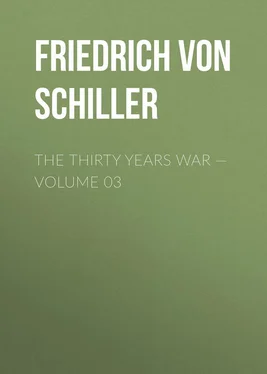Friedrich Schiller - The Thirty Years War — Volume 03
Здесь есть возможность читать онлайн «Friedrich Schiller - The Thirty Years War — Volume 03» — ознакомительный отрывок электронной книги совершенно бесплатно, а после прочтения отрывка купить полную версию. В некоторых случаях можно слушать аудио, скачать через торрент в формате fb2 и присутствует краткое содержание. Жанр: История, literature_18, foreign_antique, foreign_prose, на английском языке. Описание произведения, (предисловие) а так же отзывы посетителей доступны на портале библиотеки ЛибКат.
- Название:The Thirty Years War — Volume 03
- Автор:
- Жанр:
- Год:неизвестен
- ISBN:нет данных
- Рейтинг книги:5 / 5. Голосов: 1
-
Избранное:Добавить в избранное
- Отзывы:
-
Ваша оценка:
- 100
- 1
- 2
- 3
- 4
- 5
The Thirty Years War — Volume 03: краткое содержание, описание и аннотация
Предлагаем к чтению аннотацию, описание, краткое содержание или предисловие (зависит от того, что написал сам автор книги «The Thirty Years War — Volume 03»). Если вы не нашли необходимую информацию о книге — напишите в комментариях, мы постараемся отыскать её.
The Thirty Years War — Volume 03 — читать онлайн ознакомительный отрывок
Ниже представлен текст книги, разбитый по страницам. Система сохранения места последней прочитанной страницы, позволяет с удобством читать онлайн бесплатно книгу «The Thirty Years War — Volume 03», без необходимости каждый раз заново искать на чём Вы остановились. Поставьте закладку, и сможете в любой момент перейти на страницу, на которой закончили чтение.
Интервал:
Закладка:
The terrors of the king's irresistible strength, and the near prospect of his vengeance, had also compelled George, Landgrave of Hesse Darmstadt, to a timely submission. His connection with the Emperor, and his indifference to the Protestant cause, were no secret to the king, but he was satisfied with laughing at so impotent an enemy. As the Landgrave knew his own strength and the political situation of Germany so little, as to offer himself as mediator between the contending parties, Gustavus used jestingly to call him the peacemaker. He was frequently heard to say, when at play he was winning from the Landgrave, "that the money afforded double satisfaction, as it was Imperial coin." To his affinity with the Elector of Saxony, whom Gustavus had cause to treat with forbearance, the Landgrave was indebted for the favourable terms he obtained from the king, who contented himself with the surrender of his fortress of Russelheim, and his promise of observing a strict neutrality during the war. The Counts of Westerwald and Wetteran also visited the King in Frankfort, to offer him their assistance against the Spaniards, and to conclude an alliance, which was afterwards of great service to him. The town of Frankfort itself had reason to rejoice at the presence of this monarch, who took their commerce under his protection, and by the most effectual measures restored the fairs, which had been greatly interrupted by the war.
The Swedish army was now reinforced by ten thousand Hessians, which the Landgrave of Casse commanded. Gustavus Adolphus had already invested Koenigstein; Kostheim and Floersheim surrendered after a short siege; he was in command of the Maine; and transports were preparing with all speed at Hoechst to carry his troops across the Rhine. These preparations filled the Elector of Mentz, Anselm Casimir, with consternation; and he no longer doubted but that the storm of war would next fall upon him. As a partisan of the Emperor, and one of the most active members of the League, he could expect no better treatment than his confederates, the Bishops of Wurtzburg and Bamberg, had already experienced. The situation of his territories upon the Rhine made it necessary for the enemy to secure them, while the fertility afforded an irresistible temptation to a necessitous army. Miscalculating his own strength and that of his adversaries, the Elector flattered himself that he was able to repel force by force, and weary out the valour of the Swedes by the strength of his fortresses. He ordered the fortifications of his capital to be repaired with all diligence, provided it with every necessary for sustaining a long siege, and received into the town a garrison of 2,000 Spaniards, under Don Philip de Sylva. To prevent the approach of the Swedish transports, he endeavoured to close the mouth of the Maine by driving piles, and sinking large heaps of stones and vessels. He himself, however, accompanied by the Bishop of Worms, and carrying with him his most precious effects, took refuge in Cologne, and abandoned his capital and territories to the rapacity of a tyrannical garrison. But these preparations, which bespoke less of true courage than of weak and overweening confidence, did not prevent the Swedes from marching against Mentz, and making serious preparations for an attack upon the city. While one body of their troops poured into the Rheingau, routed the Spaniards who remained there, and levied contributions on the inhabitants, another laid the Roman Catholic towns in Westerwald and Wetterau under similar contributions. The main army had encamped at Cassel, opposite Mentz; and Bernhard, Duke of Weimar, made himself master of the Maeusethurm and the Castle of Ehrenfels, on the other side of the Rhine. Gustavus was now actively preparing to cross the river, and to blockade the town on the land side, when the movements of Tilly in Franconia suddenly called him from the siege, and obtained for the Elector a short repose.
The danger of Nuremberg, which, during the absence of Gustavus Adolphus on the Rhine, Tilly had made a show of besieging, and, in the event of resistance, threatened with the cruel fate of Magdeburg, occasioned the king suddenly to retire from before Mentz. Lest he should expose himself a second time to the reproaches of Germany, and the disgrace of abandoning a confederate city to a ferocious enemy, he hastened to its relief by forced marches. On his arrival at Frankfort, however, he heard of its spirited resistance, and of the retreat of Tilly, and lost not a moment in prosecuting his designs against Mentz. Failing in an attempt to cross the Rhine at Cassel, under the cannon of the besieged, he directed his march towards the Bergstrasse, with a view of approaching the town from an opposite quarter. Here he quickly made himself master of all the places of importance, and at Stockstadt, between Gernsheim and Oppenheim, appeared a second time upon the banks of the Rhine. The whole of the Bergstrasse was abandoned by the Spaniards, who endeavoured obstinately to defend the other bank of the river. For this purpose, they had burned or sunk all the vessels in the neighbourhood, and arranged a formidable force on the banks, in case the king should attempt the passage at that place.
On this occasion, the king's impetuosity exposed him to great danger of falling into the hands of the enemy. In order to reconnoitre the opposite bank, he crossed the river in a small boat; he had scarcely landed when he was attacked by a party of Spanish horse, from whose hands he only saved himself by a precipitate retreat. Having at last, with the assistance of the neighbouring fishermen, succeeded in procuring a few transports, he despatched two of them across the river, bearing Count Brahe and 300 Swedes. Scarcely had this officer time to entrench himself on the opposite bank, when he was attacked by 14 squadrons of Spanish dragoons and cuirassiers. Superior as the enemy was in number, Count Brahe, with his small force, bravely defended himself, and gained time for the king to support him with fresh troops. The Spaniards at last retired with the loss of 600 men, some taking refuge in Oppenheim, and others in Mentz. A lion of marble on a high pillar, holding a naked sword in his paw, and a helmet on his head, was erected seventy years after the event, to point out to the traveller the spot where the immortal monarch crossed the great river of Germany.
Gustavus Adolphus now conveyed his artillery and the greater part of his troops over the river, and laid siege to Oppenheim, which, after a brave resistance, was, on the 8th December, 1631, carried by storm. Five hundred Spaniards, who had so courageously defended the place, fell indiscriminately a sacrifice to the fury of the Swedes. The crossing of the Rhine by Gustavus struck terror into the Spaniards and Lorrainers, who had thought themselves protected by the river from the vengeance of the Swedes. Rapid flight was now their only security; every place incapable of an effectual defence was immediately abandoned. After a long train of outrages on the defenceless citizens, the troops of Lorraine evacuated Worms, which, before their departure, they treated with wanton cruelty. The Spaniards hastened to shut themselves up in Frankenthal, where they hoped to defy the victorious arms of Gustavus Adolphus.
The king lost no time in prosecuting his designs against Mentz, into which the flower of the Spanish troops had thrown themselves. While he advanced on the left bank of the Rhine, the Landgrave of Hesse Cassel moved forward on the other, reducing several strong places on his march. The besieged Spaniards, though hemmed in on both sides, displayed at first a bold determination, and threw, for several days, a shower of bombs into the Swedish camp, which cost the king many of his bravest soldiers. But notwithstanding, the Swedes continually gained ground, and had at last advanced so close to the ditch that they prepared seriously for storming the place. The courage of the besieged now began to droop. They trembled before the furious impetuosity of the Swedish soldiers, of which Marienberg, in Wurtzburg, had afforded so fearful an example. The same dreadful fate awaited Mentz, if taken by storm; and the enemy might even be easily tempted to revenge the carnage of Magdeburg on this rich and magnificent residence of a Roman Catholic prince. To save the town, rather than their own lives, the Spanish garrison capitulated on the fourth day, and obtained from the magnanimity of Gustavus a safe conduct to Luxembourg; the greater part of them, however, following the example of many others, enlisted in the service of Sweden.
Читать дальшеИнтервал:
Закладка:
Похожие книги на «The Thirty Years War — Volume 03»
Представляем Вашему вниманию похожие книги на «The Thirty Years War — Volume 03» списком для выбора. Мы отобрали схожую по названию и смыслу литературу в надежде предоставить читателям больше вариантов отыскать новые, интересные, ещё непрочитанные произведения.
Обсуждение, отзывы о книге «The Thirty Years War — Volume 03» и просто собственные мнения читателей. Оставьте ваши комментарии, напишите, что Вы думаете о произведении, его смысле или главных героях. Укажите что конкретно понравилось, а что нет, и почему Вы так считаете.











